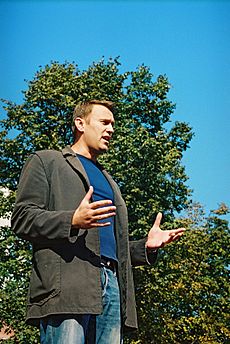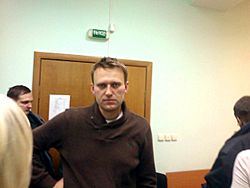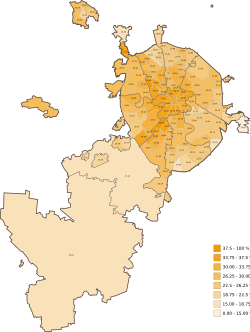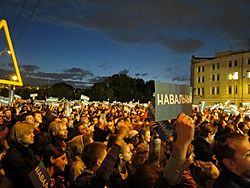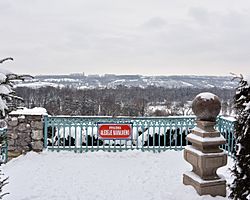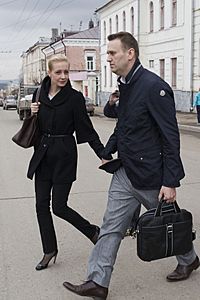Alexei Navalny facts for kids
Quick facts for kids
Alexei Navalny
|
|
|---|---|
|
Алексей Навальный
|
|
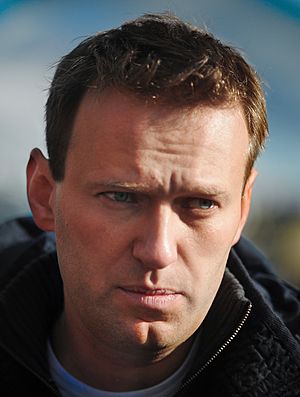
Navalny in 2011
|
|
| Leader of Russia of the Future | |
| In office 28 March 2019 – 17 January 2021 |
|
| Deputy | Leonid Volkov |
| Preceded by | Ivan Zhdanov |
| Succeeded by | Leonid Volkov (acting) |
| In office 17 November 2013 – 19 May 2018 |
|
| Preceded by | Office established |
| Succeeded by | Ivan Zhdanov |
| Chairman of the Session of the Russian Opposition Coordination Council | |
| In office 27 October – 24 November 2012 |
|
| Preceded by | Office established |
| Succeeded by | Garry Kasparov |
| Member of the Russian Opposition Coordination Council | |
| In office 22 October 2012 – 19 October 2013 |
|
| Freelance Advisor to the Governor of Kirov Oblast | |
| In office 4 May – 11 September 2009 |
|
| Governor | Nikita Belykh |
| Chief of Staff of the Yabloko Moscow Regional Branch | |
| In office 12 April 2004 – 22 February 2007 |
|
| Personal details | |
| Born | 4 June 1976 Butyn, Odintsovsky District, Moscow Oblast, Russian SFSR, USSR |
| Died | 16 February 2024 (aged 47) FKU IK-3, Kharp, Yamalo-Nenets Autonomous Okrug, Russia |
| Political party |
|
| Other political affiliations |
|
| Spouse |
Yulia Abrosimova
(m. 2000) |
| Children | 2 |
| Residence | Moscow |
| Education |
|
| Occupation |
|
| Known for | Anti-corruption activism |
| Awards |
|
| Signature |  |
| Website | , NavalnyLiveChannel |
| YouTube information | |
| Subscribers | 6.21 million (16 February 2024) |
| Total views | 1.49 billion (16 February 2024) |
Alexei Anatolievich Navalny (Russian: Алексей Анатольевич Навальный, IPA: [ɐlʲɪkˈsʲej ɐnɐˈtolʲjɪvʲɪtɕ nɐˈvalʲnɨj]; 4 June 1976 – 16 February 2024) was a Russian opposition leader, lawyer, anti-corruption activist and a political prisoner. He organised anti-government demonstrations and ran for office to advocate reforms against corruption in Russia, and against President Vladimir Putin and his government. Navalny was the leader of the Russia of the Future party and founder of the Anti-Corruption Foundation (FBK). He was recognised by Amnesty International as a prisoner of conscience, and was awarded the Sakharov Prize for his work on human rights.
Navalny had more than six million YouTube subscribers; through his social media channels, he and his team have published material about corruption in Russia, organised political demonstrations and promoted his campaigns.
In August 2020, Navalny was hospitalised in serious condition after being poisoned with a Novichok nerve agent. He was medically evacuated to Berlin and discharged a month later. Navalny accused Putin of being responsible for his poisoning, and an investigation implicated agents from the Federal Security Service. In January 2021, Navalny returned to Russia and was immediately detained on accusations of violating parole conditions while he was in Germany which were imposed as a result of his 2014 conviction. In February, his suspended sentence was replaced with a prison sentence of over two and half years' detention. In March 2022, Navalny was sentenced to an additional nine years in prison after being found guilty of embezzlement and contempt of court in a new trial described as a sham by Amnesty International; his appeal was rejected and in June, he was transferred to a high-security prison. On 9 June 2023 Navalny's political network, including his headquarters and the FBK, were designated as extremist organisations and liquidated by the Moscow City Court. In August 2023, Navalny was sentenced to an additional 19 years in prison on extremism charges.
On 16 February 2024, the Russian prison service reported that Navalny had died at the age of 47, allegedly from a blood clot.
Contents
Early life and career
Navalny was of Russian and Ukrainian descent. He grew up in Obninsk, about 100 kilometres (62 mi) southwest of Moscow, but spent his childhood summers with his grandmother in Ukraine, acquiring proficiency in the Ukrainian language. His parents, Anatoly Navalny and Lyudmila Navalnaya, own a basket-weaving factory, which they ran from 1994, in the village of Kobyakovo, Vologda Oblast. They were still running the factory in 2012.
Navalny graduated from Kalininets secondary school (level 3 according to the ISCED) in 1993. He graduated from the Peoples' Friendship University of Russia in 1998 with a law degree. He then studied securities and exchanges at the Financial University under the Government of the Russian Federation, graduating in 2001.
Navalny received a scholarship to the Yale World Fellows program at Yale University in 2010.
Since 1998, Navalny worked as a lawyer for various Russian companies. In 2009, Navalny became an advocate and a member of advocate's chamber (bar association). He was later deprived of his advocate status.
Political activity
In 2000, Navalny joined the Russian United Democratic Party Yabloko. In April 2004, he became Chief of staff of the Moscow branch of Yabloko, which he remained until February 2007. Also in 2004, he became Deputy Chief of the Moscow branch of the party. From 2006 to 2007, he was a member of the Federal Council of the party.
In 2005, Navalny started another youth social movement, named "DA! – Democratic Alternative". The project was not connected to Yabloko, nor any other political party. Within the movement, Navalny participated in a number of projects. In particular, he was one of the organisers of the movement-run political debates, which soon resonated in the media. Navalny also organised television debates via state-run Moscow channel TV Center; two initial episodes showed high ratings, but the show was suddenly cancelled. According to Navalny, authorities prohibited some people from receiving TV coverage.
In July 2007, Navalny resigned from the post of Deputy Chief of the Moscow branch of the party. He was consequently expelled from Yabloko for demanding a resignation of the chairman of the party, Grigory Yavlinsky. Also in 2007, Navalny co-founded the National Russian Liberation Movement, known as NAROD (The People), that sets immigration policy as a priority. The movement allied itself with two nationalist groups, the Movement Against Illegal Immigration and Great Russia.
In March 2012, after Putin was elected president, Navalny helped lead an anti-Putin rally in Moscow's Pushkinskaya Square, attended by between 14,000 and 20,000 people. After the rally, Navalny was detained by authorities for several hours, then released. On 8 May, the day after Putin was inaugurated, Navalny and Udaltsov were arrested after an anti-Putin rally at Clean Ponds, and were each given 15-day jail sentences. Amnesty International designated the two men prisoners of conscience. On 11 June, Moscow prosecutors conducted a 12-hour search of Navalny's home, office, and the apartment of one of his relatives.
2013 Moscow mayoral candidacy
| Time | Sobyanin | Navalny | Ref |
|---|---|---|---|
| 29 August–2 September | 60.1% | 21.9% | |
| 22–28 August | 63.9% | 19.8% | |
| 15–21 August | 62.5% | 20.3% | |
| 8–14 August | 63.5% | 19.9% | |
| 1–7 August | 74.6% | 15.0% | |
| 25–31 July | 76.2% | 16.7% | |
| 18–24 July | 76.6% | 15.7% | |
| 11–16 July | 76.2% | 14.4% | |
| 4–10 July | 78.5% | 10.7% | |
| 27 June–3 July | 77.9% | 10.8% |
On 30 May 2013, Sergey Sobyanin, the mayor of Moscow, argued an elected mayor is an advantage for the city compared to an appointed one, and on 4 June, he announced he would meet President Vladimir Putin and ask him for a snap election, mentioning the Muscovites would agree the governor elections should take place in the city of Moscow and the surrounding Moscow Oblast simultaneously. On 6 June, the request was granted, and the next day, the Moscow City Duma appointed the election on 8 September, the national voting day.
On 3 June, Navalny announced he would run for the post. To become an official candidate, he would need either seventy thousand signatures of Muscovites or to be pegged for the office by a registered party, and then to collect 110 signatures of municipal deputies from 110 different subdivisions (three-quarters of Moscow's 146). Navalny chose to be pegged by a party, RPR–PARNAS.
On 17 July, Navalny was registered as one of the six candidates for the Moscow mayoral election. However, on 18 July, he was sentenced to a five-year prison term for the embezzlement and fraud charges that were declared in 2012. Several hours after his sentencing, he pulled out of the race and called for a boycott of the election. However, later that day, the prosecution office requested the accused should be freed on bail and released from travel restrictions, since the verdict had not yet taken legal effect, saying that the accused had previously followed the restrictions. Navalny was a mayoral candidate, and an imprisonment would thus not comply with his rule for equal access to the electorate. On his return to Moscow after being freed, pending an appeal, he vowed to stay in the race.
Navalny received 27% of the vote while Sobyanin received 51%, winning the election.
On 9 September, the day following the election, Navalny publicly denounced the tally, saying, "We do not recognise the results. They are fake". Sobyanin's office rejected an offer of a vote recount. On 12 September, Navalny addressed the Moscow City Court to overturn the result of the poll; the court rejected the assertion. Navalny then challenged the decision in the Supreme Court of Russia, but the court ruled that the election results were legitimate.
2018 presidential election
Navalny announced his entry into the presidential race on 13 December 2016, however on 8 February 2017, the Leninsky district court of Kirov repeated its sentence of 2013 (which was previously annulled after the decision of ECHR, which ruled that Russia had violated Navalny's right to a fair trial, in the Kirovles case) and charged him with a five-year suspended sentence. This sentence, if it came into force and remained valid, might prohibit the future official registration of Navalny as a candidate. Navalny announced that he would pursue the annulment of the sentence that clearly contradicts the decision of ECHR. Moreover, Navalny announced that his presidential campaign would proceed independently of court decisions. He referred to the Russian Constitution (Article 32), which deprives only two groups of citizens of the right to be elected: those recognised by the court as legally unfit and those kept in places of confinement by a court sentence. According to Freedom House and The Economist, Navalny was the most viable contender to Vladimir Putin in the 2018 election. Navalny organised a series of anti-corruption rallies in different cities across Russia in March. This appeal was responded to by the representatives of 95 Russian cities, and four cities abroad: London, Prague, Basel and Bonn.
Navalny was attacked by unknown assailants outside his office in the Anti-Corruption Foundation on 27 April 2017. They sprayed brilliant green dye, possibly mixed with other components, into his face in a Zelyonka attack that can damage eyes of the victim. He had been attacked before, earlier in the spring. In the second attack, the green-colored disinfectant had evidently been mixed with a caustic chemical, resulting in a chemical burn to his right eye. He reportedly lost 80 percent of the sight in his right eye. Navalny accused the Kremlin of orchestrating the attack.
In December 2017, Russia's Central Electoral Commission barred Navalny from running for president in 2018, citing Navalny's corruption conviction. The European Union said Navalny's removal cast "serious doubt" on the election. Navalny called for a boycott of the 2018 presidential election, stating his removal meant that millions of Russians were being denied their vote. Navalny filed an appeal against the Russian Supreme Court's ruling on 3 January, however a few days later on 6 January, the Supreme Court of Russia rejected his appeal.
2020 constitutional referendum
Navalny campaigned against the vote on constitutional amendments that took place on 1 July, calling it a "coup" and a "violation of the constitution". He also said that the changes would allow President Putin to become "president for life". After the results were announced, he called them a "big lie" that did not reflect public opinion. The reforms include an amendment allowing Putin to serve another two terms in office (until 2036), after his fourth presidential term ends.
Poisoning and recovery
On 20 August 2020 Navalny fell ill during a flight from Tomsk to Moscow and was hospitalised in Omsk, where the plane had made an emergency landing. The change in his condition on the plane was sudden and violent, and video footage showed crewmembers on the flight scurrying towards him as he screamed loudly. Later, he said that he was not screaming from pain, but from the knowledge that he was dying.
Afterwards, his spokeswoman, Kira Yarmysh, said that he was in a coma and on a ventilator in the Omsk hospital. It was initially suspected that something was mixed into his drink. The hospital said that he was in a stable but serious condition.
A plane was sent from Germany to evacuate Navalny from Russia for treatment at the Charité Hospital in Berlin, even though the doctors treating him in Omsk initially declared he was too sick to be transported, they later released him. On 24 August, the doctors in Germany made an announcement, confirming that Navalny had been poisoned with a cholinesterase inhibitor.
Ivan Zhdanov, chief of Navalny's Anti-Corruption Foundation, said that Navalny could have been poisoned because of one of the foundation's investigations. On 2 September, the German government announced that Navalny was poisoned with a Novichok nerve agent, from the same family of nerve agents that was used to poison Sergei Skripal and his daughter. On 7 September, German doctors announced that he was out of the coma. On 15 September, Navalny's spokeswoman said that Navalny would return to Russia. On 17 September, Navalny's team said that traces of the nerve agent used to poison Navalny was detected on an empty water bottle from his hotel room in Tomsk, suggesting that he was possibly poisoned before leaving the hotel. On 23 September, Navalny was discharged from hospital after his condition had sufficiently improved. On 6 October OPCW confirmed presence of cholinesterase inhibitor from the Novichok group in Navalny's blood and urine samples.
On 14 December a joint investigation by The Insider and Bellingcat in co-operation with CNN and Der Spiegel was published, which implicated agents from Russia's Federal Security Service (FSB) in Navalny's poisoning.
On 21 December 2020 Navalny released a video showing him impersonating a Russian security official and speaking over the phone with a man identified by some investigative news media as a chemical weapons expert named Konstantin Kudryavtsev. During the call, he revealed that the poison had been placed on Navalny's clothing, particularly in his underwear, and that Navalny would have died if not for the plane's emergency landing and quick response from an ambulance crew on the runway.
In January 2021 Bellingcat, The Insider and Der Spiegel linked the unit that tracked Navalny to other deaths, including activists Timur Kuashev in 2014 and Ruslan Magomedragimov in 2015, and politician Nikita Isayev in 2019. In February, another joint investigation found that Russian opposition politician Vladimir Kara-Murza was followed by the same unit before his suspected poisonings.
The European Union, United Kingdom and United States responded to the poisoning by imposing sanctions on senior Russian officials.
Return to Russia, imprisonment and death
On 17 January 2021 Navalny returned to Russia by plane from Germany. At passport control in Moscow, he was detained. Prior to his return, the FSIN had said that Navalny might face jail time upon his arrival in Moscow for violating the terms of his probation by leaving Russia; in 2014, Navalny received a suspended sentence in the Yves Rocher case, which he called politically motivated and in 2017, the European Court of Human Rights ruled that Navalny was unfairly convicted.
A Moscow court on 2 February 2021 replaced Navalny's three and a half-year suspended sentence with a prison sentence, minus the amount of time he spent under house arrest, meaning he would spend over two and half years in a corrective labour colony. The verdict was condemned by the governments of the United States, United Kingdom, Germany, France and others as well as the EU. Immediately after the verdict was announced, protests in a number of Russian cities were held and met with a harsh police crackdown.
The European Court of Human Rights ruled on 16 February 2021 that the Russian government should release Navalny immediately, with the court saying that the resolution was made in "regard to the nature and extent of risk to the applicant's life". However, Russian officials indicated that they would not comply with the decision. In December 2020, a series of laws were also passed and signed that gave the constitution precedence over rulings made by international bodies as well international treaties.
On 28 February 2021 Navalny arrived at the Pokrov correctional colony in Vladimir Oblast. In early March, the European Union and United States imposed sanctions on senior Russian officials in response to Navalny's poisoning and imprisonment.
On 17 April 2021, it was reported that Navalny was in immediate need of medical attention. Navalny's personal doctor Anastasia Vasilyeva and three other doctors, including cardiologist Yaroslav Ashikhmin, asked prison officials to grant them immediate access, stating on social media that "our patient can die any minute", due to an increased risk of a fatal cardiac arrest or kidney failure "at any moment". Test results obtained by Navalny's lawyers showed heightened levels of potassium in the blood, which can bring on cardiac arrest, and sharply elevated creatinine levels, indicating impaired kidneys. Navalny's results showed blood potassium levels of 7.1 mmol; blood potassium levels higher than 6.0 mmol (millimoles) per liter usually require immediate treatment.
Later that night, an open letter, addressed to Putin and open for Russian citizens to sign, was signed and published by 11 politicians representing several regional parliaments, demanding an independent doctor be allowed to visit Navalny, and for a review and cancellation of all of his criminal cases. The following day, his daughter called on Russian prison authorities to let her father be checked by doctors in a tweet written from Stanford University, where she is a student. Prominent celebrities such as J.K. Rowling and Jude Law also addressed a letter to Russian authorities asking to provide Navalny with proper medical treatment. U.S. president Joe Biden called his treatment "totally unfair" and National Security Advisor Jake Sullivan said that the Kremlin had been warned "that there will be consequences if Mr. Navalny dies."
On 19 April 2021 Navalny was moved from prison to a hospital for convicts. In mid-June 2022, Navalny was transferred to the maximum security prison IK-6 in Melekhovo, Vladimir Oblast.
On 4 August 2023, Navalny was sentenced to an additional 19 years in prison on charges including publicly inciting extremist activity, financing extremist activity, and "rehabilitating Nazi ideology"; the Moscow City Court found him guilty on all charges in a closed-doors trial.
On 16 February 2024, the Federal Penitentiary Service announced that Navalny had died in prison.
Political positions
Same-sex marriage
In 2017, Leonid Volkov, Navalny's chief of staff, said that Navalny's team supports the legalisation of same-sex marriage.
Foreign
Navalny was described as "shar[ing] the establishment view that Russia is entitled to a say in the domestic affairs of its post-Soviet neighbors," and supported the expansion of the Eurasian Economic Union. He also called on Russia to recognize and militarily support Abkhazia and South Ossetia in 2008, following the Russo-Georgian War.
In June 2020, he spoke out in support of the Black Lives Matter protests against racism.
Syria
In 2016, Navalny spoke against the Russian intervention in the Syrian civil war, believing that there are internal problems in Russia that need to be dealt with rather than to get involved in foreign wars.
Awards and honours
Navalny was named "Person of the Year 2009" by Russian business newspaper Vedomosti and by stock exchange observer Stock in Focus.
On 22 April 2010, Navalny was awarded the Finance magazine prize in the nomination "for protecting the rights of minority shareholders".
Navalny was a World Fellow at Yale University's World Fellows Program, aimed at "creating a global network of emerging leaders and to broaden international understanding" in 2010.
In 2011, Foreign Policy magazine named Navalny to the FP Top 100 Global Thinkers, along with Daniel Domscheit-Berg and Sami Ben Gharbia of Tunisia, for "shaping the new world of government transparency". FP picked him again in 2012. He was listed by Time magazine in 2012 as one of the world's 100 most influential people, the only Russian on the list. In 2013, Navalny came in at No. 48 among "world thinkers" in an online poll by the UK magazine Prospect.
In 2015, Alexei and Oleg Navalny were chosen to receive the "Prize of the Platform of European Memory and Conscience 2015".
In June 2017, Navalny was included Time magazine's list of the World's 25 Most Influential People on the Internet. In December 2017, he was named "Politician of the Year 2017" by Vedomosti.
He was named "Politician of the Year 2019" by readers of Vedomosti.
Navalny was nominated for the 2021 Nobel Peace Prize by multiple Norwegian members of parliament. An Internet petition to the Nobel Committee in support of Mr. Navalny's candidacy has been signed by over 38,000 people.
Following Navalny's imprisonment in February 2021, the Boris Nemtsov Foundation for Freedom awarded Navalny with the Boris Nemtsov Prize for Courage. A scenic viewpoint of Alexei Navalny was also set in Prague in direct view from the Russian Embassy, near Boris Nemtsov Square in front of the Russian Embassy and the Anna Politkovskaya Promenade.
On 8 June 2021, Navalny's daughter accepted the Moral Courage Award at the Geneva Summit for Human Rights and Democracy on behalf of her father. Navalny dedicated the prize to political prisoners. In September 2021, Navalny was included in Time magazine's list of the 100 most influential people. This was his second appearance on the list, having previously been included in 2012.
In September 2021, he was awarded the Knight of Freedom Award conferred by the Casimir Pulaski Foundation.
In October 2021, he received the Sakharov Prize, the European Parliament's annual human rights prize. Later that same year, he also received a German prize for his efforts in sustaining freedom of expression – the M100 Media Award.
Family and personal life
Navalny was married to Yulia Navalnaya and had two children, daughter Daria and son Zakhar.
Books and publications
- OPPOSING FORCES: Plotting the New Russia
See also
 In Spanish: Alekséi Navalni para niños
In Spanish: Alekséi Navalni para niños


